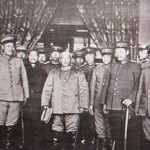Not very long ago the British people decided they had had enough of Blairism, not enhanced much by Brownism when Tony Blair stood down as prime minister. Typically, they just managed to elect a Tory premier – without a majority. It never matters to the British people (or the Spanish for that matter) what an elected government actually achieves during its mandate, only that it should be of the right colour, usually red. The British had the chance to elect a new type of government which, had it obtained an absolute majority, could have had at least the opportunity to pull poor old Britain up by the bootstraps. Instead, the voters forever besotted with the idea that Socialism is the ninth wonder of the world, landed the Brits with a coalition.
But this coalition is turning out better than many cynics predicted. The economic crisis has forced politicians to act with vigour, and some concern for the country’s condition – instead of merely sticking to their creed, no matter what happens. Cameron won with the help of a vague idea that things would get better if there were a ‘Big Society’. But the actual measures the coalition has taken to alleviate the crisis have been determined and courageous. Risks have been taken with future voting that would never in a million years be taken by Spanish politicians.
Cameron/Clegg have cut public spending precisely where it should be cut, at the cost of putting many bureaucrats and civil servants into the dole queue. Some of them might even have to sell their third house. Public spending under Blair and especially the ‘man from the manse’ had gained a magnitude that ran out of control. Cameron’s idea is to make the maximum number of cuts in the shortest time possible in order to reduce the deficit and governmental debts. Later come more specific cuts, all within the public sector, though some things are, apparently untouchable; Health, Education, Pensions, the Social Services (though some cuts are expected in this sector) and safety on the roads are sacrosanct. There are at present no plans to raise personal income tax, as long as unemployment, calculated at around 8% shows no increase. Cameron has not attacked the rich, though Clegg’s liberal party would like him to.
The drastic measures now in action have not, contrary to jeremiads from the Left, caused public consternation. The unions have moaned, but then that is the reason for their existence. If Thatcher had not virtually castrated them in the 80s Cameron would have been unable to act as he has. Here again a comparison with Spain must be made; in Spain the unions, especially the two largest, CC.OO and UGT, have simply been bought by the Socialist Workers’ Party, and join the many other minions of the President of Spain’s Government. Nevertheless, in a recent poll 51% of those asked thought Cameron has been a little drastic with the scissors, though in general the British people are gently applauding, rather than caterwauling. Many newspapers agree that it will be the middle class, especially the middle class with children, who will be affected the most.
The Stock Exchange seems to be with Cameron/Clegg. Standard and Poors have withdrawn criticism of the cuts, and returned Britain’s standing in the world market to AAA. The economy has rises in this third 4-month period by 0.8%, which is unexpected but pleasurable.
Now we must wait for the budget forecasts in 2011. If they are too restrictive they will damage recovery, but strong economic discipline must be maintained, or the coalition will lose votes. The British have notoriously bad memories, and many of the frightful or infantile recorms and laws made by Blair/Brown have already been forgotten by the voters who were taught from the cradle by Fabianite parents to vote red whatever their personal convictions tell them. Brown in his two years as unelected premier invented more than 10,000 new laws, 99% of which were restrictive.
Retirement age for workers will go up by one year to 66, but in 2020. There are plans afoot to raise retirement age to 67 in 2036, and 68 in 2046, so young people at present in work know what they have to look forward to.
The State will shortly lose some 500,000 public sector workers, considered an admirable move except by the workers involved. Readers should remember that Gordon Brown during his years as Chancellor and later Premier invented more public jobs than this figure, at tremendous cost to the taxpayer, so it is possible that Cameron is simply removing a recently imposed burden.
Defence will get 8% less, and this is to a certain extent the fault of the military leaders who insisted during the Blair years on ordering the most expensive foreign materiel, instead of using cheaper home-made weaponry. Again, an essential balance is being sought by Cameron. The military cuts will mostly affect personnel. 42,000 people will have to go, but wait –most of these are civilians anyway, originally employed by Brown. 25,000 civil servants work for the Ministry of Defence, which is as ludicrous and indefensible as it sounds. The Airforce will lose 5000 men and women in uniform; the Navy another 5000, and the British Army 7000.
An unpopular move is to increase the top-up fees at public universities (an increase from £3,290 to £9000 per annum, but each centre must be seen to offer a generous system of grants). An innovation is that graduates must begin to return credits when they are in work and earn more than £21,000 a year. Cameron also supports a revolutionary idea, planned by associations of parents from all the classes. There will be newly founded state schools actually run and managed by parents, institutions and commerce. This concept might put paid to the simply dreadful state education system in which (free?) schools are controlled not by the professionals who teach there, but by some local committee formed by local government. This reform alone might well ensure David Cameron a deserved second term, with a little bit of luck with enough majority to govern by himself, and not in coalition.










As Nancy Mitford’s ‘Uncle Matt’ would have said, this is ‘dangerous good writing’. I hope that this clerical (‘Dean’) author keeps up the good work. See his ‘The Fall and Rise of Socialism’.
This is a very good writing. I think the comparison with the Spanish management is brilliant and hits the mark.
Congratulations